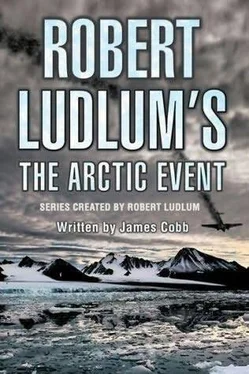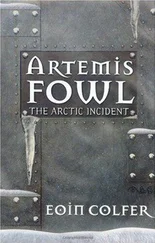
James Cobb, Robert Ludlum
The Arctic Event
The seventh book in the Covert-One series
March 5, 1953
The Canadian Arctic
Nothing lived on the island. Nothing could.
It was a jagged ridge of raw, storm-savaged rock thrusting through the ice and freezing waters of the Arctic Ocean only a short distance from the Earth’s magnetic pole. A shallow crescent twelve miles in length from east to west, it tapered from two miles in width at its broadest point to a quarter mile at its tips, with something of a cove on its westernmost end. Two prominent peaks rose out of its narrow, boulder-strewn coastal plain, a glaciated saddleback joining them.
Lichen and a few tufts of stunted, frost-burned sea grass clung to bare existence amid its fissured stone. A few kittiwakes and fulmars would roost on its cliffs during the brief arctic summer. The occasional seal or walrus would haul out on its gravel beaches, and the rare lordly polar bear would pad ghostlike amid its freezing fogs.
But nothing truly lived there.
The island was one of the myriad crumbs of continent scattered between the northern coast of Canada and the Pole. Collectively they were called the Queen Elizabeth Archipelago, and each was as bleak and blizzard blasted as the next.
For the bulk of its existence, the island had been unknown and unvisited by humanity. Some far-ranging Inuit hunter might have seen its peaks rising above the sea smoke on the distant horizon. If he had, the necessities of survival for himself and his tribe had prevented any further investigation.
Or possibly some Victorian-era arctic explorer caught up in the vain quest for the Northwest Passage might have sketched the island onto his crude map with a mittened hand. If so, his had been one of the ice-doomed ships that never returned.
The island and its sisters did not enter into the affairs of mankind until the coming of the appropriately named Cold War. The Queen Elizabeth Archipelago was photo surveyed in the late 1940s by the United States Air Force as a precursor to the construction of the North American Air Defense Command’s Distant Early Warning radar line. The island gained a name then. The bored military cartographer who added it to the world’s charts dubbed it Wednesday because it had to be called something and because its survey run had passed over his desk in the middle of the week.
Not long afterward, Wednesday Island received its first visitation.
A williwaw was blasting down from the Pole through the primordial darkness of an arctic winter, its winds screaming around the island’s peaks, scouring the snow from their northern faces, leaving the black basalt naked to the storm.
Possibly that was why the island went unseen until it was too late.
Faintly, the sound of powerful aircraft engines came from the north, riding with the wind, growing swiftly in intensity. But there was no one to hear their thunder as they passed low over the island’s coastline. Too low. The roar of the engines suddenly increased, spurred into a howl of desperation-born power.
The howl ended abruptly in the harsh, tearing slam of metal hitting on ice, and the eternal winds shrieked in triumph.
Wednesday Island ceased to be a point of concern for another half century.
The Present Day
The Canadian Arctic
Clad in Day-Glo orange parkas and snowmobiling suits, the three rope-linked figures leaned on their ice axes, forcing themselves up the last few yards to their goal. They had made their climb on the southern face of the ridge, its bulk shielding them from the prevailing wind. But now, as they struggled over the lip of the small, bare rock plateau at its peak, the full blast of the polar katabatics raked them, the wind chill driving the effective temperature from merely below freezing to well below zero.
It was a pleasant autumn afternoon on Wednesday Island.
The pale, heatless ball of the sun rolled along the southern horizon, filling the world with the strange, grayish glow of the weeks-long arctic twilight.
Looking down at the surrounding ocean, it was difficult to tell island from sea. The pack was closing in around Wednesday, the new, living ice buckling and jumbling up on the beaches. The only leads of free, dark water to be seen trailed behind the drifting icebergs on the horizon as they resisted the frozen constriction of the coming winter.
To the east, the driving winds had drawn a snow squall across the far end of the island, blurring the second, taller mountain into an ominous dark bulk hinted at behind a ragged curtain of mist.
The vista was that of hell with the furnaces shut down, yet the three who viewed it were of the breed who found such sights exhilarating.
The team leader threw his head back and challenged the wind with a wild wolf howl. “I claim this mountain by right of conquest and hereby name it…What in the hell are we going to name it anyway?”
“You were first man up, Ian,” the smallest of the three climbers pointed out, her voice muffled by her wind mask. “So by rights it should be Mount Rutherford.”
“Agh, no! This should not be!” the third member of the climbing team protested. “Our lovely Miss Brown is the first lady to climb this formidable peak. It should be Mount Kayla.”
“That’s very sweet, Stefan, but it still won’t rate you more than a handshake back at the station.”
Ian Rutherford, an Oxford biology major, chuckled. “I suppose we shouldn’t worry about it. No matter what we might name it, we’ll just end up calling it West Peak as we always have.”
“You suffer from excessive realism, Ian.” Stefan Kropodkin, of McGill’s cosmic ray research program, grinned into the heavy woolen muffler that covered the lower half of his face.
“I think we need a little realism at the moment.” Kayla Brown was in geophysics at Purdue. “We’re already an hour off our schedule, and Dr. Creston wasn’t too happy about us coming up here in the first place.”
“Another man with little romance in his soul,” Kropodkin grunted.
“We still have enough time for a few photographs,” Rutherford replied, unslinging his rucksack. “Cresty certainly can’t object to that.”
They saw it as they cautiously worked around the perimeter of the tiny plateau, and it was the sharp eyes of the little geophysicist-to-be from Indiana who made the discovery.
“Hey, guys, what’s that? Down there on the glacier.”
Rutherford peered down into the saddle between the peaks. There was something there, just barely visible through the snow haze. He shoved his goggles up and pulled his binoculars out of their case. Being careful not to allow their frigid metal to touch his facial skin, he peered through them.
“Bloody hell! There is something down there!” He passed the field glasses to his friend. “What do you think, Stefan?”
The Eastern European looked for a long time. Then he lowered the binoculars. “It’s a plane,” he said wonderingly, “a plane on the ice.”
Huckleberry Ridge Mountain Warfare Training Center
Lieutenant Colonel Jonathan “Jon” Smith U.S. Army, MD, stood with his back to the edge of the cliff and took his final look around.
It was beautiful up here. From this point, one could look southward along the western slope of the Cascade range, the mountains all stone blue-gray, snow-frost white and forest evergreen. Shreds of mist hovered protectively over the lower slopes, and the golden glow of the sunrise streamed through the notchbacks of the ridgeline. With a further twist of his head he could include the distant, shattered cone of Mount St. Helens in his field of vision, a thin haze of steam cupped in the volcano’s gaping crater.
Читать дальше













